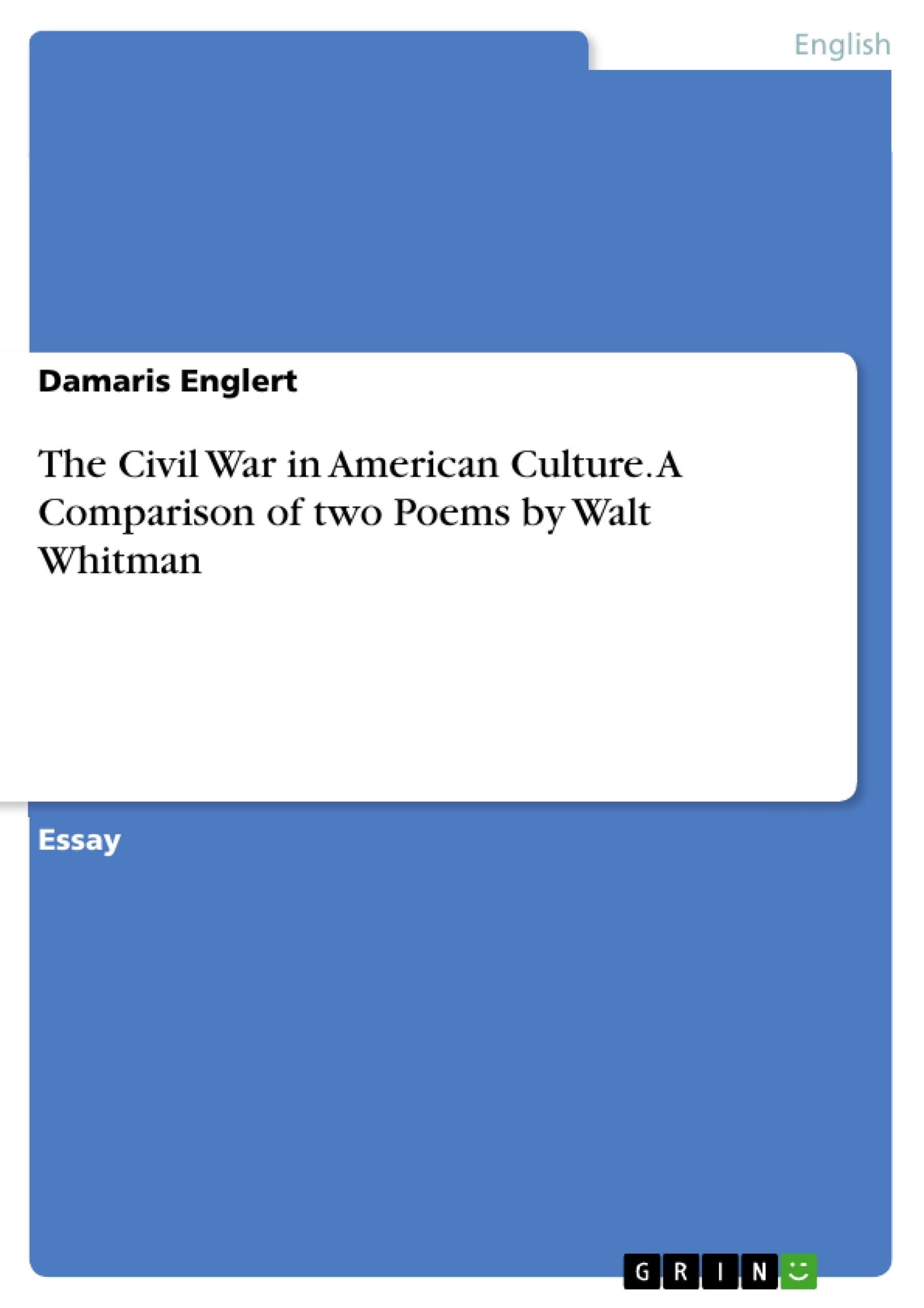The Civil War (1861-1865) was a significant and crucial experience for the still young nation of the United States. As a logical consequence, it immediately became a very important topic in American literature and culture. In this essay, I am going to compare two poems by Walt Whitman in order show the transformation in the perception and the resulting representation of the Civil War in American culture.
Across all areas of culture, there is a development in the way the war is depicted. Whitman's own transformation from celebration to mourning is typical for the change undergone by the entire nation. Both poems are part of Whitman's collection Drum-Taps which was published in 1865, after the end of the war. However, they were created at different times. The first poem I am going to look at, First O songs for a prelude, was written in 1861 after the first battle at Fort Sumter and the resulting outbreak of the Civil War. The date of the second poem, The Wound-Dresser, is not exactly known, but Whitman certainly created it after 1862. That was the year where he found out that his brother was missing and then set out to look for him around the battlefields. So by the time The Wound-Dresser was written, Whitman had actually experienced war and undergone a comprehensive transformation, just as the whole nation.
Inhaltsverzeichnis (Table of Contents)
- Representations of the Civil War in American Culture
- First O songs for a prelude
- The Wound-Dresser
Zielsetzung und Themenschwerpunkte (Objectives and Key Themes)
This essay compares two poems by Walt Whitman to demonstrate the transformation in the perception and representation of the Civil War in American culture. The analysis highlights the shift from initial celebration to disillusionment, a change experienced by both Whitman and the nation as a whole.
- The evolution of war representation in American culture
- Walt Whitman's personal transformation from celebrating war to mourning its consequences
- The contrast between idealistic views of war and the harsh realities experienced during the conflict
- The human cost of war and the impact on individual suffering
- The shift from a focus on national unity and heroic ideals to a recognition of the individual human experience of war
Zusammenfassung der Kapitel (Chapter Summaries)
The first chapter focuses on Whitman's poem "First O songs for a prelude," written in 1861 at the outbreak of the Civil War. This poem celebrates war as a glorious opportunity for national unity and heroism, reflecting the initial enthusiasm of the nation. The chapter analyzes the poem's themes of heroism, community, and the idealized view of war.
The second chapter examines Whitman's poem "The Wound-Dresser," written after 1862, following Whitman's personal experience of war. This poem reflects a stark contrast to the first, portraying the disillusionment and suffering that war brings. The chapter explores themes of individual suffering, the psychological impact of war, and the loss of idealistic views.
Schlüsselwörter (Keywords)
This essay examines the representation of the Civil War in American culture, focusing on Walt Whitman's poetry as a case study. Key themes include the glorification of war, the disillusionment with war, the human cost of war, individual suffering, and the transformation in perception and representation of the Civil War.
Frequently Asked Questions
Which two Walt Whitman poems are compared in this essay?
The essay compares "First O songs for a prelude" and "The Wound-Dresser," both from the collection Drum-Taps.
What transformation does the essay illustrate?
It illustrates the shift from an initial celebration and idealization of the Civil War to a perspective of mourning and disillusionment.
When was "First O songs for a prelude" written?
It was written in 1861, right after the outbreak of the war following the battle at Fort Sumter.
How does "The Wound-Dresser" differ in tone?
It focuses on the harsh realities of war, individual suffering, and the psychological impact, reflecting Whitman's personal experience on battlefields.
Why is Whitman's poetry considered a case study for American culture?
His personal shift from enthusiasm to recognition of the human cost of war mirrored the transformation undergone by the entire nation during 1861-1865.
- Quote paper
- Damaris Englert (Author), 2014, The Civil War in American Culture. A Comparison of two Poems by Walt Whitman, Munich, GRIN Verlag, https://www.grin.com/document/337629



